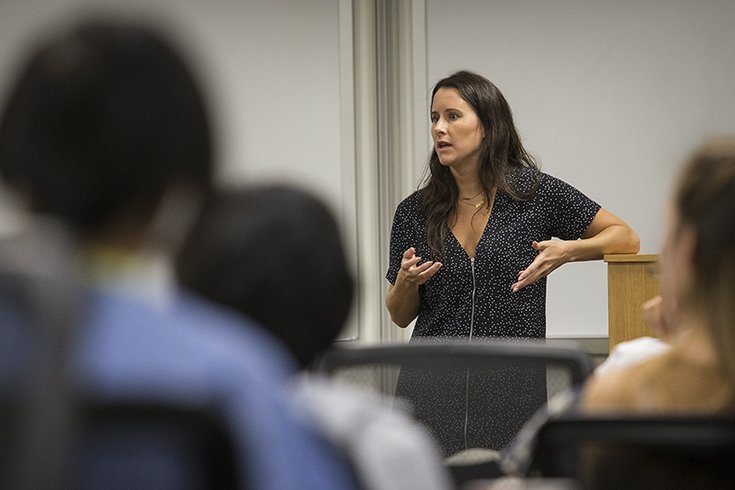
September 22, 2016
 Joseph V. Labolito-Temple University Photographer/for PhillyVoice
Joseph V. Labolito-Temple University Photographer/for PhillyVoice
Naomi Rosenberg, a Temple University Hospital doctor, talks to students at the Lewis Katz School of Medicine
A heart-wrenching essay about what it's like to tell a mother that her child is dead, which was the most read on the New York Times' website for about 24 hours, came from the mind of Naomi Rosenberg's who learned the advice in a North Philadelphia hospital.
Rosenberg is an emergency room doctor at Temple University Hospital and an assistant professor of emergency medicine. Her piece, "How to Tell a Mother Her Child is Dead" was published in the newspaper on Sept. 3.
“One of the things we see a lot is people who lose a family member, so I wrote about my experience participating in that process,” she told Temple University. “And as much as anything, the essay is about violence and violence prevention.”
Rosenberg enrolled in a nonfiction writing workshop after she finished uher residency at Temple Hospital.
The full essay can be read on the New York Times' website, but here's an excerpt:
If the mother has another son with her and he has punched the wall or broken the chair, do not be worried. The one that punched the wall or broke the chair will be better than the one who looks down and refuses to cry. The one who punched the wall or broke the chair will be much easier than the sister who looks up and closes her eyes as they fill.
Security is already outside the room and when they hear the first loud noise they will know to come in. No, you will not have to tell them. They know about the family room in the emergency department in summer in North Philadelphia. It is all right. They will be kind. If the chair cannot be sat in again that is all right. We have money for new chairs every summer. If he does not break your chair you stay in your chair. If he does you find a new place to sit. You are here for the mother and you have more to do.
The university also launched a "Narrative Medicine" program that focuses on "the human side" of the industry that's headed by Pulitzer-Prize winning writer Michael Vitez, who has medical students write stories like Rosenberg's.
Amazing and powerful piece of writing by a Temple ER doc. An incredible debut by Dr. Naomi Rosenberg! https://t.co/FuluYtc3gc
— michael vitez (@michaelvitez) September 4, 2016
"... building this program will be a great opportunity, especially at a place like Temple, which is in the heart of North Philadelphia and serves one of the poorest communities in America," Vitez writes on his website. "I want to share my storytelling skills, my appreciation for stories, with the students, and help them develop theirs. I want to encourage the students to write and reflect, to process their experiences and express their feelings."
Beautiful, powerful, imaginable writing @nytimes How to Tell a Mother Her Child Is Dead https://t.co/WSyIS1C1yb
— Yvonne Ivey, MLIS (@ypivey) September 20, 2016
Beautifully written piece about the most painful part of a doctor's job https://t.co/WOSX9HBtKA
— Keerea Mazz (@kmazz007) September 17, 2016
NSFW because it will rip your heart out.
— Ty Graham (@tygraham) September 19, 2016
How to Tell a Mother Her Child Is Dead https://t.co/NQCJOS0tyt